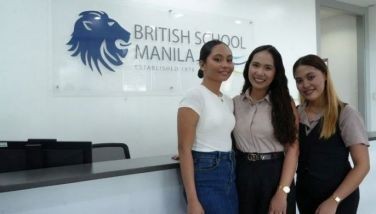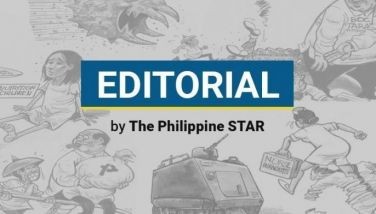Preparing for recovery

Crude oil prices slumped further below $37 per barrel yesterday, reflecting weak demand and indicating that we haven’t seen the worst of the global economic slowdown.
Companies big and small are shutting down, construction and big-ticket infrastructure projects are on indefinite hold or have been scrapped, and more workers are losing their jobs.
But amid all the woes, everyone is talking about economic recovery. The only question is when. With a coordinated global response and people swallowing bitter pills, this could take place later this year, which is the most positive forecast.
What does everyone do for the rest of the year?
The most efficient economies are racing to be ahead of the pack when recovery starts. The Philippines should do the same, improving national competitiveness during the slowdown.
Some of the areas that need special attention can be found in the index of economic freedom, where the Philippines placed a dismal 104tamong 183 countries in the latest ranking.
* * *
The 2009 Index of Economic Freedom, prepared by the Washington-based think tank Heritage Foundation together with The Wall Street Journal, is based on 10 indicators. The latest index ranked Hong Kong as the freest economy in the world, followed by Singapore.
What is economic freedom? According to those who draw up the index, “The highest form of economic freedom provides an absolute right of property ownership, fully realized freedoms of movement for labor, capital, and goods, and an absolute absence of coercion or constraint of economic liberty beyond the extent necessary for citizens to protect and maintain liberty itself. In other words, individuals are free to work, produce, consume, and invest in any way they please, and that freedom is both protected by the state and unconstrained by the state.”
The Philippines’ score improved by 0.8 points this year, pulled up by improvements in monetary and investment freedoms (rated 77.2 and 40, respectively).
But we scored lowest in “freedom from corruption” with an abysmal 25, way below the world average of 40.3, as well as the enforcement of intellectual property rights where our score was 30.
On property rights, it was noted: “The judicial system is weak. Judges are nominally independent, but some have been appointed strictly for political reasons and are corrupt. Organized crime is a strong impediment to the administration of justice, and delays and uncertainty concern investors.”
On freedom from corruption, this was the comment: “Corruption is perceived as pervasive… A culture of corruption is long-standing. Enforcement of anti-corruption laws is inconsistent, and the public perception of judicial, executive and legislative corruption remains high.”
It was noted that overall progress on structural economic reforms has been mixed, with the country still heavily dependent on the remittances of overseas workers.
“The government imposes both formal and non-formal barriers to foreign investment. Contracts can be hard to enforce. Inflation is moderate, but the government subsidizes the prices of several basic goods. The judicial system is weak and vulnerable to extensive political influence,” the report observed.
Many of these observations have been made over the years by investors in the Philippines. Progress has been made in fiscal reforms, but many problems are still waiting for official action.
In the index, the Philippines ranked ahead of India (131), China (132), Nepal (133) and Vietnam (145). But it was way behind Malaysia (58) and Thailand (67), and ranked below Uganda (63), Nicaragua (84), Lebanon (95), Bhutan (100), Pakistan (102) and Yemen (103).
* * *
Singapore, which is Hong Kong’s rival in terms of economic freedom, transparency and effective governance, is taking the downturn as an opportunity to attend to internal problems and improve its competitiveness when global recovery starts. As most economic experts predict, this will be later in the year at the earliest.
The city-state is officially in recession and acknowledges that many of the factors are beyond its control. But it wants to be poised for rapid takeoff when the economy starts recovering.
A priority is education — already one of the best in Asia. Singapore is hiring 3,000 additional teachers, according to its ambassador to Manila, A. Selverajah. That’s a lot for a country with a total population of only 4.8 million. The city-state is positioning itself as the destination for those who want world-class education in Asia.
The tiny population — there are only 3.1 million Singapore citizens, according to 2008 figures — is also a constant source of concern, with the government unable for several years now to persuade its career-oriented citizens to go and multiply. The fertility rate is static at 1.29, way below the population “replacement level” of 2.1.
Singapore doesn’t have enough citizens to fill all the jobs in the city-state, which is why the population of migrant workers is growing. To address the situation and at the same time assist its citizens in the recession, the Singapore government is encouraging post-retirement employment in the private sector. Senior citizens debilitated by age cannot expect the same compensation and benefits that they received in their prime, but the post-retirement jobs will keep them busy and give them a degree of financial independence.
Retirees may like the scheme, which was started last year, but so far the response of private employers has been tepid, Ambassador Selverajah told me. The government is currently debating whether post-retirement employment should be legislated.
In the Philippines, the government is preparing several pump-priming schemes as well as direct assistance to the poorest of the poor this year.
The country should also use the slowdown as a period for attending to its homework. During the Asian financial crisis in 1997, we weren’t the worst hit, but we were left behind by our neighbors in the race toward recovery.
This time we should do better. We are plodding along when we should be sprinting, and competing with the best of them.
- Latest
- Trending























